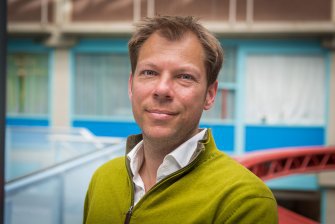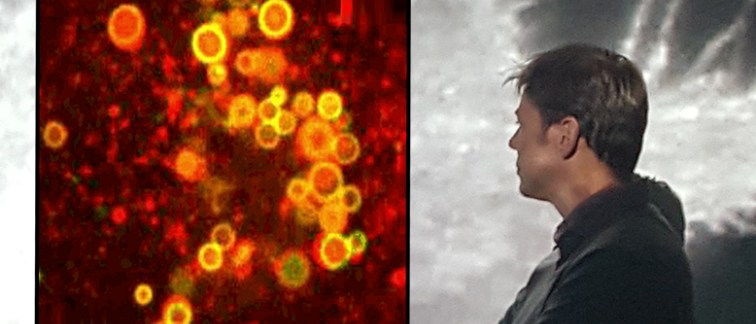In the edition of ‘What do you do & why do you do it?’, scientist Michiel Pegtel tells us about his research and describes his many organizational and strategic roles.
What do you do?
Michiel: “Above all, I am a Principal Investigator studying exosomes. These are small vesicles released by many cell types into the bloodstream and local tissue environment. The proteins, DNA, and RNA molecules packaged in exosomes can influence other body cells that take these vesicles in.
At the Exosome Research Group (ERG) - a multidisciplinary lab - we focus on the role of exosomes in human disease - in particular cancer. We investigate whether exosomes contain biomarkers that are potentially useful for cancer diagnostics, and if these vesicles can be used for drug delivery. In addition, we look at the more fundamental question of how exosomes are generated and secreted. The new confocal microscope purchased by Cancer Center Amsterdam (CCA) will really support this line of research.”
What other hats are you wearing?
“Quite a few, actually! To start off with, I am a member of the CCA Research Board, the CCA Valorization Board, and the ADORE Research Board. As part of the CCA Research Board, my specific role is in the biomarker field - to ensure that all scientists who do biomarker research at CCA know each other and know about our in-house expertise.
“In general, the CCA Research Board is working to stimulate cancer research by bringing all oncology scientists and physicians at Amsterdam UMC together. We also support research by discussing what strategic investments should be made to support research facilities.
“The Research Board overviews the seed funding provided by Cancer Center Amsterdam Foundation that goes to critical new research, early-stage projects that you know are quite risky, but may deliver a big impact. The Research Board - supported by theme members - help CCA researchers with grant applications at the Dutch Cancer Society (KWF) as well, to make proposals as good as possible. I think this is one of the reasons we have been very successful in obtaining KWF funding over recent years.”
What do you do on the CCA Valorization Board?
“Based on my knowledge on the development of biomarkers and taking these from a research stage to a clinical test, I have a seat on the CCA Valorization Board. Together with Martine Chamuleau and the IXA business development managers, we support valorization initiatives to bring new diagnostics and therapies for patients with cancer into the clinic.
“This process requires a very different skill set and expertise than performing research. There are many pitfalls - I can tell you that from experience - but some can be circumvented. Researchers may think they have found a great diagnostic biomarker, but often things do not work out in the ‘real world’ due to practical technicalities. Acknowledging these unforeseen pitfalls early on can save a lot of money, time and frustration.
“For example, the required blood volume may exceed that what a patient can give, or the turn-around time between sampling and data availability may be too long, making even the best performing test useless for disease monitoring. So, I see it as my task to point out these pitfalls to colleagues and identify and support research findings with valid valorization potential.”
And the ADORE Research Board?
“Together with Yolanda Pijnenburg en Charlotte Teunissen, I am connecting research into tumor and neuro biomarkers. We will share our expertise and samples collected from patients in our biobanks. The ADORE Research Board is also reaching out to potential investors and raising awareness about the ADORE initiative, which is very unique. We highly anticipate that the cross pollination between oncology and neurology will set the stage to uncover new and surprising insights.
“We also make much better use of the available money through technology and equipment sharing. A neuron is of course not a cancer or an immune cell, but if you look at fundamental processes, many of the same biological principles apply. In my lab, we have learned a lot about exosomes by applying a microscopic assay that was originally developed to study neurotransmitters release. Other examples are lysosomes, endosomes, or the cellular recycling process ‘autophagy’, these are frequently dysfunctional in tumors just as in neurodegenerative diseases. We are often studying the same fundamental processes. In the new building that is currently under construction, researchers in neuro and cancer biology can meet each other often, so we can come up with new insights faster.”
What about the Liquid Biopsy Center at Cancer Center Amsterdam?
“I am indeed the head of Liquid Biopsy Center (LBC), together with Maarten Bijlsma who is overseeing the collection of blood and urine samples at our Meibergdreef location. The aim of the LBC is to collect fluid samples from patients with cancer before, during, and after therapy. We have already included thousands of patients who donated samples at successive time points. These samples are important for research to find new diagnostic biomarkers.
“For example, in patient’s blood samples, we are investigating circulating tumor DNA or exosomes to see if we can extract diagnostic information - like health status, response to therapy, or whether the tumor is still present after treatment completion. In patients with lymphoma, we have already found biomarkers in blood that tell whether the treatment is effective after one single therapy cycle. This is very important! It tells physicians early on whether the therapy works or whether a different treatment is needed. We are now working to develop these research findings into a validated diagnostic test.
“We are also expanding the LBC to include samples from cancer patients from regional hospitals. These patients often have a less complex disease than patients receiving treatment at Cancer Center Amsterdam. It is so crucial to include these patients to gather ‘real world evidence' – data needed to validate if a new test or treatment actually works. Equally important are samples donated by healthy controls. To collect these, we have launched a ‘spouse program’ where we ask healthy partners of patients to participate in research. There is a lot of interest in our LBC, the organization, infrastructure, sample processing and standardization. I see that we are heading towards a national network for liquid biopsy sampling for cancer research.”
How do you do it?
“Follow your interest – don’t be afraid to make mistakes – mistakes will happen and are essential to find better ways. Also, use your experiences to educate others - so they won’t make the same mistakes. Look at trends and promising developments. You won’t find the latest disruptive discoveries in PubMed, but rather in pre-publications on BioRxiv, or even earlier in Google Patents online.”

Why do you do it?
“I have a driving passion for understanding the fundamental biological process of cell-cell communication through exosomes which is crucial for normal processes like wound healing and the workings of our immune system. Yet, viruses and cancer cells co-opt this process while it is disturbed in neurodegenerative disease. At the Department of Pathology - where I’m employed - my team and I perform curiosity driven research around this topic to discover new biomarkers and drug targets. I can’t imagine doing anything short of everything I can to make a difference.”
For more information, contact Dr. Michiel Pegtel.
As noted on the Amsterdam UMC website: ‘Michiel is an inventor of multiple patents and co-founder of ExBiome B.V., a molecular small RNA' diagnostics start-up that aims to develop liquid biopsy tests to predict response to therapy early such that clinicians are better informed on the efficacy of treatment.’
This article was created for Cancer Center Amsterdam.
© 2023 NHBC– All rights reserved.

